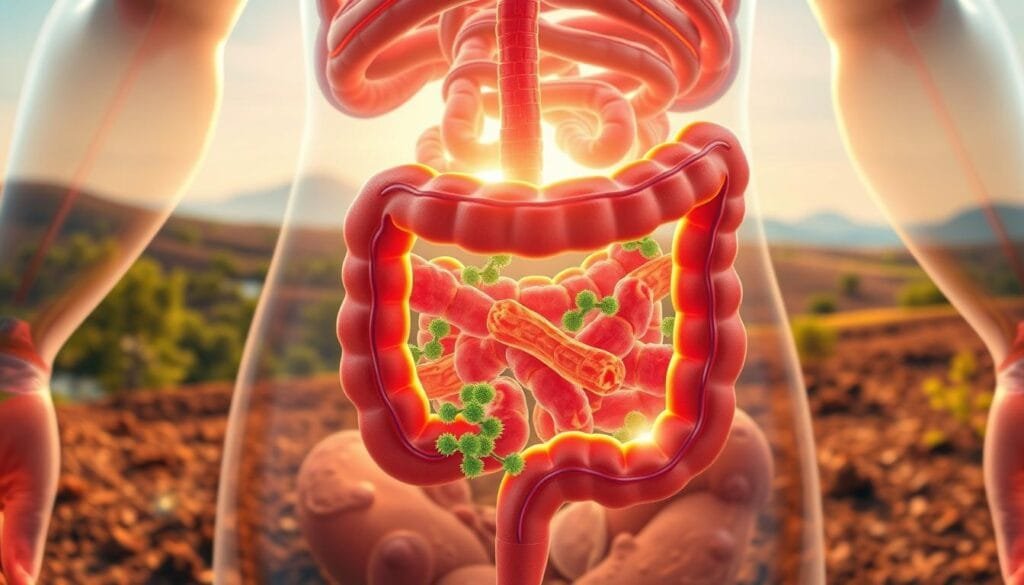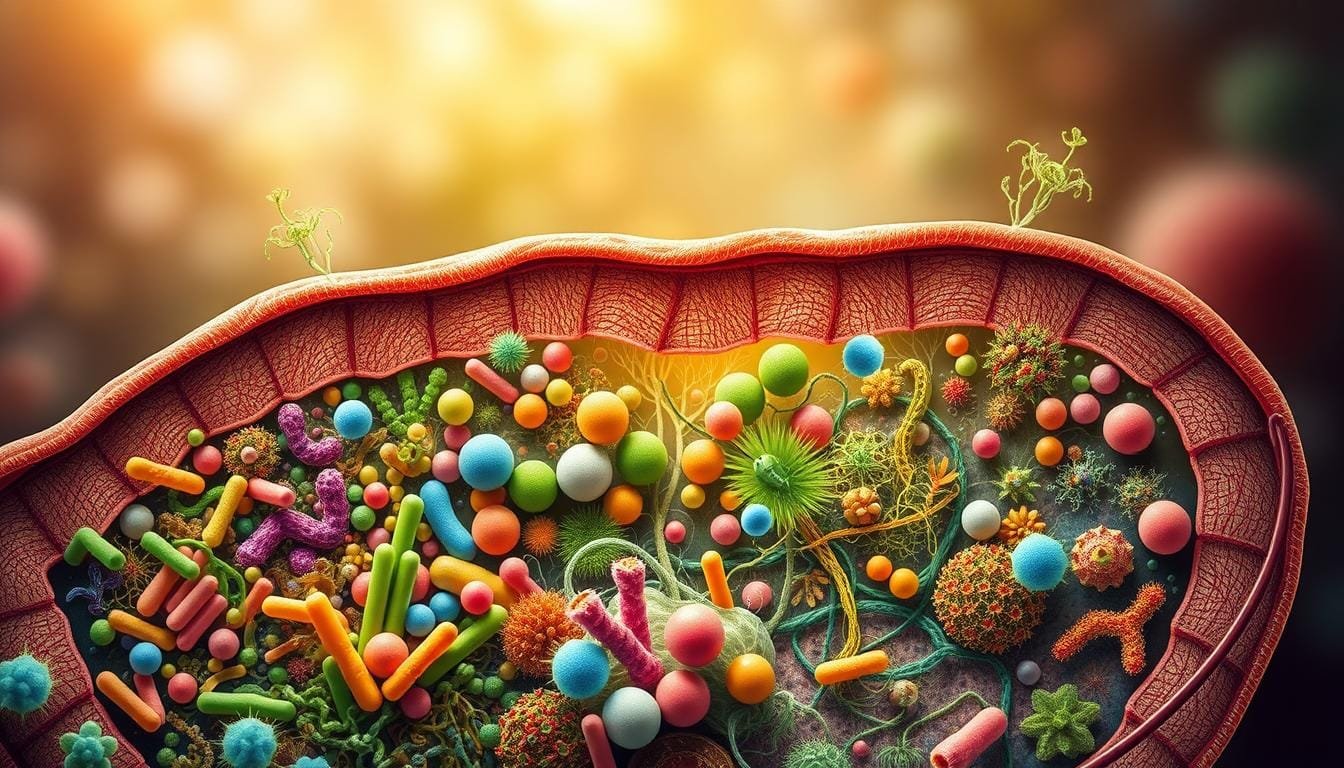Currently Empty: RM0.00
Did you know that antibiotics can disrupt the gut microbiome, the community of trillions of microorganisms essential for overall health? This imbalance often leads to digestive issues and weakened immunity. Fortunately, probiotics can help restore balance, but timing matters.
Research from UCLA and the journal Cell highlights that probiotics play a crucial role in rebuilding the gut after antibiotic use. Dr. Emeran A. Mayer, a leading expert, emphasizes the importance of restoring the microbiome to prevent long-term health complications.
Natural food sources like yogurt, kimchi, and sauerkraut also support gut recovery. Wellness Concept, a trusted name in health advice, recommends combining probiotics with a balanced diet for optimal results. For personalized guidance, contact Wellness Concept at +60123822655 during business hours.
Key Takeaways
- Antibiotics can disrupt the gut microbiome, leading to health issues.
- Probiotics help restore balance and support gut recovery.
- Research shows timing is crucial for effective probiotic use.
- Fermented foods like yogurt and kimchi aid in microbiome restoration.
- Wellness Concept offers expert advice for maintaining gut health.
Understanding Antibiotics and Gut Health
Antibiotics are powerful tools in fighting infections, but they come with a cost to gut health. While they target harmful bacteria, they also disrupt the beneficial ones essential for a balanced microbiome. This imbalance, known as dysbiosis, can lead to digestive issues and weakened immunity.
Impact of Antibiotics on the Gut Microbiome
Research shows that antibiotics reduce the diversity of gut bacteria, creating an environment where harmful microbes can thrive. Studies indicate that this disruption can last for months, even after the treatment ends. Symptoms like diarrhea and bloating are common signs of this imbalance.
Wellness Concept emphasizes the importance of recognizing these symptoms early. Their experts recommend monitoring gut health during and after antibiotic use to prevent long-term complications. For personalized advice, contact them at +60123822655 during business hours.
Recognizing Common Gut Health Symptoms
Common signs of gut imbalance include diarrhea, constipation, and abdominal discomfort. These symptoms often arise from the overgrowth of harmful bacteria in the gut. Dysbiosis can also weaken the immune system, making the body more susceptible to infections.
Using probiotic products can help restore balance, but it’s essential to choose the right strains. Wellness Concept offers expert guidance on selecting the best product for your needs. Learn more about gut health strategies in their detailed guide.
How long to take probiotics after antibiotics
The timing of probiotic intake plays a pivotal role in restoring gut health post-antibiotics. Studies reveal that the duration and strategy of taking probiotics significantly impact the recovery of the system. For instance, research from the journal Cell shows that probiotics can colonize the gut but may delay its return to normalcy compared to other treatments.

Research Insights on Probiotic Timing
Clinical studies highlight both the positive and counterproductive effects of probiotic timing. A study divided participants into two groups: one received an 11-strain probiotic treatment, while the other received a placebo. The placebo group’s gut microbiota returned to health in three weeks, while the probiotic group took six months to recover.
“Probiotics can effectively colonize the gut, but their timing must be carefully managed to avoid delaying recovery.”
In contrast, autologous fecal transplantation restored the gut microbiome within eight days. This alternative treatment offers faster recovery but is currently limited to specific conditions like C. difficile colitis.
Individual Responses and Prebiotics
Person-specific variations also play a role in treatment outcomes. Some individuals may experience faster recovery, while others require extended probiotic use. Combining prebiotics with probiotics can maximize the benefit, as prebiotics fuel the growth of beneficial bacteria.
| Treatment | Recovery Time | Key Benefit |
|---|---|---|
| Probiotics | 6 months | Colonizes gut with new bacteria |
| Placebo | 3 weeks | Natural recovery |
| Fecal Transplantation | 8 days | Rapid restoration |
For personalized advice on taking probiotics and optimizing gut health, consult Wellness Concept. Their experts provide tailored recommendations to ensure effective recovery.
Exploring the Role of Probiotics and Prebiotics
Probiotics and prebiotics work together to support a healthy gut microbiome. While probiotics introduce beneficial bacteria, prebiotics act as fuel for these microbes. This synergy helps restore balance, especially after disruptions like antibiotic use.
Benefits and Limitations of Probiotic Supplementation
Probiotic supplements are widely used to address gut imbalances. They can reduce symptoms like diarrhea and bloating, which often occur after a course of antibiotics. Studies show that specific strains, such as Lactobacillus and Bifidobacterium, are particularly effective.
However, supplements have limitations. Their effect varies depending on the strain and dosage. Some individuals may not respond as expected, and overuse can sometimes delay natural recovery. It’s essential to choose high-quality products and consult experts like Wellness Concept for guidance.
Natural Sources and Fermented Food Options
Fermented foods are excellent natural sources of probiotics. Yogurt, kimchi, and sauerkraut are rich in beneficial bacteria and can support gut health. These foods also provide prebiotics, which enhance the growth of good bacteria.
Combining natural sources with supplements can maximize the benefit. For example, eating yogurt daily while taking a probiotic supplement can speed up recovery after antibiotic use. Wellness Concept recommends a balanced approach for optimal results.
| Source | Key Benefit | Limitation |
|---|---|---|
| Probiotics Supplements | Targeted strains for specific symptoms | Varied effectiveness |
| Fermented Foods | Natural and nutrient-rich | May not provide enough bacteria |
For personalized advice on restoring gut health, contact Wellness Concept at +60123822655. Their friendly experts are ready to help you navigate the best options for your needs.
Clinical Research and Expert Insights
Global research sheds light on the complex dynamics of gut microbiota restoration. Recent studies highlight the nuanced effects of probiotics on recovery, especially after antibiotic use. These findings provide valuable insights for both researchers and individuals seeking to maintain optimal gut health.
Latest Study Findings from Global Research
Clinical studies reveal that while probiotics can support gut health, their timing and use may sometimes delay natural recovery. For instance, research published in Cell found that probiotic supplementation prolonged the restoration of gut microbiota compared to placebo groups. This delay is attributed to the colonization of new bacteria, which can temporarily disrupt the existing microbial balance.
Another study examined the role of probiotics in supporting the immune system. Results showed that specific strains, such as Lactobacillus and Bifidobacterium, enhanced immune responses. However, overuse of probiotics was linked to increased gas production and discomfort in some participants.
“The timing and strain selection of probiotics are critical factors in achieving optimal gut health.”
Diverse Opinions from Nutrition Experts
Nutrition experts offer varied perspectives on the use of probiotics after antibiotics. Some, like the team at DR.VEGAN, advocate for a balanced approach that combines probiotics with prebiotics to fuel beneficial bacteria. Others emphasize the importance of allowing the gut microbiota to recover naturally without additional interventions.
Key points from expert discussions include:
- Probiotics can enhance the immune system but may delay natural recovery in some cases.
- Prebiotics, found in foods like oats and bananas, support the growth of beneficial bacteria.
- Individual responses to probiotics vary, making personalized guidance essential.
For evidence-based recommendations, consult trusted sources like Wellness Concept. Their experts provide tailored advice to ensure effective gut health strategies.
Diet and Lifestyle Strategies to Enhance Gut Microbiome
A balanced diet and healthy lifestyle are key to restoring gut health after antibiotic treatment. By incorporating specific foods and habits, you can rebuild and sustain a thriving microbe community in your body.
Incorporating Fiber and Prebiotic-rich Foods
Fiber-rich foods like artichokes, asparagus, and garlic are essential for gut recovery. These foods act as fuel for beneficial microbes, helping them thrive. Prebiotics, found in chicory and bananas, further support this process by promoting the growth of good bacteria.
Research shows that a diet high in these foods can reduce symptoms like antibiotic-associated diarrhea. For example, a 2019 study found that garlic increases gut microbiome diversity, enhancing overall gut health.
Lifestyle Strategies for Optimal Gut Health
Beyond diet, lifestyle choices play a crucial role. Prioritizing sleep, managing stress, and staying hydrated can significantly improve gut health. Chronic stress, for instance, disrupts the microbe balance, while adequate sleep supports recovery.
Combining these strategies with probiotic and prebiotic use maximizes benefits. For personalized advice, contact Wellness Concept at +60123822655. Their experts can guide you in creating a tailored plan for your needs.
| Food Type | Key Benefit | Example |
|---|---|---|
| Fiber-rich | Supports beneficial bacteria | Artichokes, asparagus |
| Prebiotic | Fuels microbial growth | Garlic, chicory |
| Fermented | Introduces live bacteria | Yogurt, kimchi |
By making strategic food choices and adopting healthy habits, you can restore your gut health and prevent common issues like antibiotic-associated diarrhea. For more tips, explore Wellness Concept’s resources or reach out to their friendly team.
Connecting with Wellness Concept: Hours & Contact Details
Maintaining gut health requires accessible support and expert guidance. Wellness Concept is here to help you navigate your gut health journey with ease. Whether you’re dealing with diarrhea or working to restore your microbiome back to balance, their team is ready to assist.

Business Hours and Service Availability
Wellness Concept offers flexible hours to accommodate your schedule. Their friendly team is available throughout the week to provide personalized advice and support. Here’s a breakdown of their business hours:
| Day | Hours |
|---|---|
| Monday | 9:30 am – 6:30 pm |
| Tuesday | 9:30 am – 6:30 pm |
| Wednesday | 9:30 am – 6:30 pm |
| Thursday | 9:30 am – 6:30 pm |
| Friday | 9:30 am – 6:30 pm |
| Saturday | 10 am – 5 pm |
| Sunday | 10 am – 5 pm |
Contact Information: WhatsApp +60123822655
For immediate inquiries, Wellness Concept can be reached via WhatsApp at +60123822655. This direct line ensures quick responses to your questions about microbiota restoration or other gut health concerns. Their experts are ready to guide you through the process, whether you’re recovering from a following antibiotic treatment or seeking long-term solutions.
Accessible communication channels are essential for addressing gut health issues effectively. Wellness Concept’s approachable team ensures you receive the support you need, any day of the week. For more insights on maintaining a healthy gut, explore their detailed guide.
Conclusion
Restoring gut health after antibiotic use involves a thoughtful approach. Research highlights the importance of balancing probiotic supplements with natural dietary sources like yogurt and kimchi. While supplements can aid recovery, over-reliance may lead to issues such as antibiotic-associated diarrhea.
Experts emphasize the role of the immune system in this process. A healthy gut supports overall well-being, making it essential to choose the right strategies. Combining prebiotics with probiotics may also enhance the benefits, fueling beneficial bacteria in the tract.
Personalized guidance is key. Wellness Concept offers tailored advice to help you navigate your gut health journey. Have you considered how your diet and lifestyle impact your immune health? Reach out to their experts for support and ensure your gut thrives.
FAQ
What happens to the gut microbiome during antibiotic treatment?
Antibiotics can disrupt the balance of the gut microbiome by killing both harmful and beneficial bacteria. This imbalance may lead to symptoms like diarrhea, bloating, or gas.
Can probiotics help restore gut health after antibiotics?
Yes, probiotics can support the recovery of the gut microbiome by reintroducing beneficial bacteria. They may also reduce the risk of antibiotic-associated diarrhea and improve overall gut health.
Are there natural sources of probiotics besides supplements?
Absolutely! Fermented foods like yogurt, kefir, sauerkraut, kimchi, and kombucha are excellent natural sources of probiotics that can help replenish gut bacteria.
How do prebiotics support gut health?
Prebiotics are non-digestible fibers that feed beneficial gut bacteria. Foods like garlic, onions, bananas, and oats are rich in prebiotics and help promote a healthy microbiome.
What are the benefits of combining probiotics and prebiotics?
Combining probiotics and prebiotics, known as synbiotics, can enhance gut health by supporting the growth and activity of beneficial bacteria, improving digestion, and boosting the immune system.
What are the signs of an imbalanced gut microbiome?
Common symptoms include bloating, gas, diarrhea, constipation, fatigue, and even mood changes. These may indicate a need to restore gut health.
Can diet and lifestyle improve gut health after antibiotics?
Yes, eating fiber-rich foods, staying hydrated, managing stress, and incorporating probiotic-rich foods can all help rebuild a healthy gut microbiome.
Are there risks associated with taking probiotics?
While generally safe, some people may experience mild side effects like gas or bloating. Those with weakened immune systems should consult a healthcare provider before starting probiotics.
What does recent research say about probiotics and antibiotics?
Studies suggest that taking probiotics during or after antibiotic treatment can reduce the risk of antibiotic-associated diarrhea and support faster recovery of the gut microbiome.
How can I contact Wellness Concept for more information?
You can reach Wellness Concept via WhatsApp at +60123822655 for inquiries about their services and business hours.



